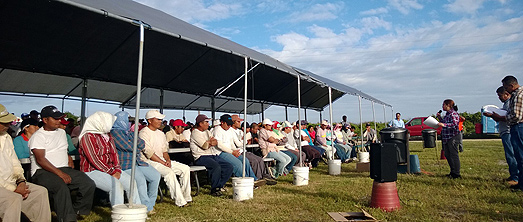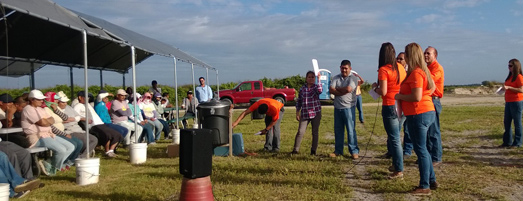[hupso_hide][hupso title=”From the front lines of the #FairFoodProgram! Education team sends photos from the fields…” url=”https://ciw-online.org/?p=17079″]
As the Fair Food Program enters its third full season in effect, the CIW’s worker-to-worker education program hits the fields across the state!
 Just a quick reminder this morning of what we are fighting for when we fight for Fair Food:
Just a quick reminder this morning of what we are fighting for when we fight for Fair Food:
Above is a picture taken just hours ago — under new shade structures constructed to comply with the Fair Food Code of Conduct — at a farm in Muse, Florida, about an hour north of Immokalee. It is a picture depicting the very foundation of the CIW’s award-winning Fair Food Program (FFP), the worker-to-worker education process that ensures that farmworkers know and understand their protections under the FFP so that they can fulfill their role as 30,000 full-time monitors identifying and reporting code violations as they occur.
This morning before dawn, the education crew gathered at the CIW’s community center in Immokalee and climbed into the van that crisscrosses the state from November to May, helping new workers learn about their rights under the Fair Food Code of Conduct and reminding veteran workers about the essential role they play in making those rights real. They arrived an hour later at the farm above, and, together with the company’s human resources team (pictured below in the bright orange shirts designed to make them easily identifiable to workers in the fields), launched into the education session, on the farm and on the clock.
The worker-to-worker education program is one of the essential elements of the Fair Food Program that distinguishes the FFP from virtually every other social responsibility program out there today. Rather than be satisfied with once-a-year audits, which are little better than a snapshot of conditions that can change daily, or a complaint line that never receives calls because workers have no idea what their rights are or how to defend them, the FFP relies on multiple layers of monitoring and protections to ensure compliance with the code of conduct. From CIW-designed education materials, distributed and viewed by all workers at the time of hire, to face-to-face education sessions like this one, a 24-hour complaint line, and regular announced and unannounced audits — all backed by strict market consequences — the Fair Food Program is a wall-to-wall system of education, monitoring, and enforcement. Its comprehensive design makes the FFP the most effective social accountability program in US agriculture today and a model for real, measurable, worker-driven human rights protection being studied from California to Bangladesh.
The notion of the CIW traveling from farm to farm to inform workers of their rights, or of teams of human resources personnel dedicated to ensuring that workers’ rights are respected, would have been a distant dream only a few years ago in Florida. But today it is a reality that takes place on farms across the state nearly every day of the harvest season.
And that’s what we are fighting for when we hit the streets to demand Fair Food now from Wendy’s, Publix, Kroger, Giant, Stop & Shop, and the rest of the supermarket industry. And with that reminder, let’s make next week’s Wendy’s Founders Week of Action a week to remember!

